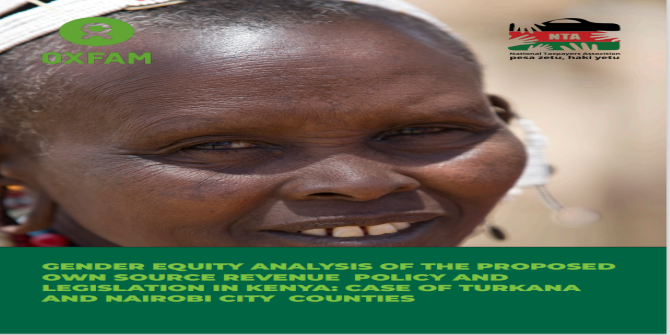The purpose of this review was to identify proposed interventions in the National Policy to Support Enhancement of County Governments’ Own-Source Revenue (OSR) and the County Governments (Revenue Raising Process) Bill, 2018 that undermine or have potential to undermine needs of the heterogeneities of all women from a gender equity. This policy and legal framework are interventions of the National Treasury and other partners to address underperformance of County Governments’ Own-Source Revenue (OSR). The OSR policy highlights numerous challenges facing performance of local revenue among them inadequate revenue policies and legislation; multi- plicity of fees and charges; human resource capacity deficits; weaknesses in enforcing compliance by taxpayers; low automation and integration of revenue administration; ineffective internal controls and audit mechanisms. The study also provides a comparative analysis on revenue performance for Turkana and Nairobi county, and establishes patterns and trends of revenue mobilization to provide appropriate recommendations that situate the policy and the legal provisions within the respective contexts.
The study is anchored on Feminist Critical Policy Analysis Framework and Feminist Standpoint Theory. It em- ployed descriptive design to examine the proposed policy and bill to detect those provisions that undermine gender equity in collection of revenue. The target population for this study include the key stakeholders in for- mulation and implementation of the OSR policy and law. The review used Expert Sampling technique to select participants based on their expertise on the phenomenon issues being studied. The sample size for this study was thirty (30) respondents drawn from County Executive committee Members, Lodwar Municipality, National Land Commission, County Assembly committees and organized interest groups. The study used an unstructured Key Informant Interview Guide to collect primary data from the respondents. Quantitative data were analyzed us- ing descriptive and inferential statistics. Thematic analysis was used to analyze qualitative data. The results were presented in the tables, figures, charts, and narratives. The researchers obtained authorization from the National Commission on Science Technology and Innovation and the County Commissioners before proceeding to collect data from the participants.
Findings revealed several interventions within the policy and law that undermine or have the potential to under- mine gender equity. Institutions that represent and promote the rights of women including the state department for Gender and the National Gender and Equality Commission did not participate in the formulation of this pol- icy. This omission has the potential to overlook the needs of women and produce a gender-neutral policy. Regu- lations on waivers and variations are neutral on gender equity, the provisions on proposals for new taxes, fees and charges by County Governments do not include an indication of the likely economic impact and tax burden on women as a marginalized group.
Additionally, County governments are meant to develop principal legislations and policies on which to collect their taxes, fees, and charges. This has potential to formulate male gendered legislations since County Assemblies and executive committee members are male dominated as observed in other countries. The situation is similar between the two counties under study. For example, there are 17 female MCAs out of the total 47 in Turkana County Assembly, and out of 10 County Executive Committee Members (CECM), only 3 are females. In Nairobi City County, female MCAs are 40 against 83 male counterparts. On the executive side, out of the 8 CECMs in office, only 2 are females. Provisions prescribing a standardized revenue collection through electronic payments includ- ing: Mobile money, direct bank deposits, credit and debit cards and e-wallet have potential to undermine gender equity as a majority of women still fall behind their male counterparts on ICT access and utilization. In addition, the President’s direction to the National Treasury to implement a single revenue collection system integrated with National Government systems for all the Counties poses a gender equity issue.
The National treasury is considering whether to recommend to the counties the Kenya Revenue Authority (KRA) - iTax System, E-citizen, adopt one of the solutions implemented in a County or develop a new County revenue management system. Provisions such as simba and itax are being displayed as successes by simplifying filing of returns in contrast to manual paper filing. This provision also violates the guiding taxation principle of simplicity and enforceability. This provision will therefore pause a challenge to poor women in the rural and informal set- tlements in their effort to comply with this provision. The study identifies Independent Boundaries and Electoral Commission (IBEC), KRA, the National Treasury, Council of Governors, County executives, County Assemblies, Ministry of Devolution, International Monetary Fund, and the World Bank as the most influential institutions in formulation and implementation of this policy.
CESS on Transport of Charcoal, Hide & skin, firewood, and miraa is the highest contributor to OSR in Turkana County followed by Single Business Permit and fees from Hides and Skins. Advertisement and Liquor Licenses 1 contribute the least. This implies that women contribute most to these streams given that most charcoal, firewood and hide and skins businesses are owned by them. The county does not have revenue streams on land rates, this could be because most of land in the County is not registered and is communally owned. In Nairobi, land rates and business permits are the highest contributors to the County’s OSR despite using a very old valuation roll that was last updated in 1982. The study recommends inclusion of the State department for gender and National Gender and Equality Commission in formulation of this policy and law, review and during introduction of new revenue streams or waivers. The study also recommends that OSR should be reviewed to incorporate gender eq- uity principles. The government and other stakeholders should also promote data collection on gender needs for ease of policy and bill implementation. The study further recommends that the valuation rolls in both counties be updated regularly to enhance collection of land rates and property rates. The County governments should initiate programs for boosting women’s skills in access and use of ICT
